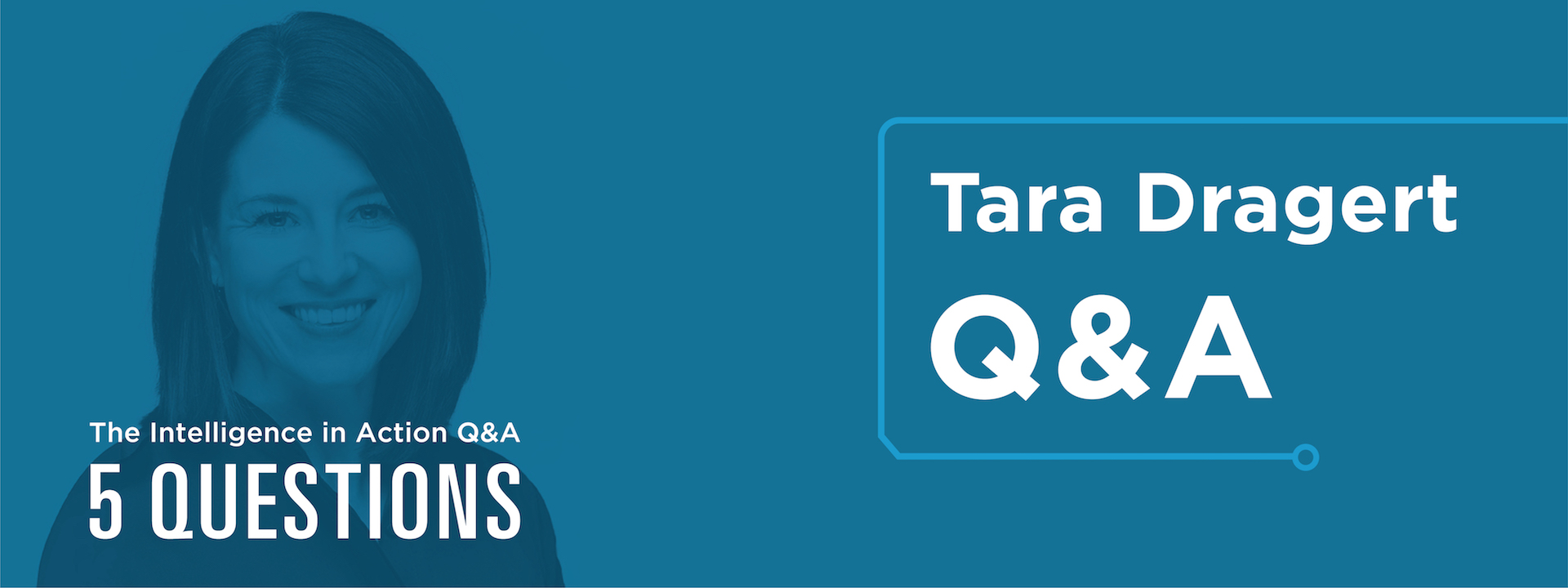Tara Dragert has a drive for creating harmonious environments, both at home and at work. This knack for solving problems, which has been a continuum in her career, as well as her desire to bring out the best in those around her, brought her to her role as Vice President of Product Innovation. She and her team work every day to make progress on one of the most pressing challenges in HIT, one that most certainly requires harmony: interoperability.
1. How would you talk about the need for healthcare interoperability at a cocktail party?
You ask, “Have you ever gone to the doctor—the one you’ve been seeing for years--and had to answer the same questions 15 times? Have you gone to a specialist and they should know everything about you, but you're filling out those forms again?” For most of us, it’s an annoyance, but for folks who are spending a lot of their time with doctors it’s much, much more than an annoyance.
I also find that young, healthy individuals, or people who have not had to care for someone sick or vulnerable, often think the situation is far better than it actually is. They don't realize that their health data doesn't move with them or notice all the places where their provider can lack vital information. But as you get older, and your parents age, or maybe you’ve had a baby, and your peers accumulate similar experiences, you become much more acutely aware of the need for greater healthcare interoperability. So much is at stake.
2. When you sit down with colleagues who are working to improve interoperability, what topics or trends are you talking about lately? What are you excited about?
Wow. There's just so much going on. I find the regulatory landscape fascinating. There are big pieces of regulation on the docket that could transform the industry. I’m often captivated and try to understand why the industry chose to move this piece of interoperability forward and not that one over there. What’s the impact going to be? I’m also excited by the promise of big data and predictive analytics. We’re making progress, in that there are pilots, there are pockets of innovation. I see all this and I can imagine in some years this work will fundamentally change the way we think about healthcare.
The other thing to note is how regulators, the media, even those of us within the market talk about interoperability. We sometimes say, “Well, now, this is the silver bullet that is going to get us to the finish line” in reference to some new standard or legislation. Or there’s surprise that we’re even still talking about interoperability. I find that a curious mindset because, while we have to celebrate all these milestones and steps forward, it’s not like there's a ‘done’ with interoperability. I mean would anyone ever say, “Are we done with science yet? Have we solved it?” As with any innovation, you keep discovering, you keep peeling back problems. You solve one problem and then realize you’ve a better way to solve that problem, and you invent again. We're continuing to innovate and improve and reimagine and add to that solution stack. As long as we’re advancing medicine, we’re probably going to keep talking about advancing interoperability. And that’s exciting.
3. Not counting colleagues at Surescripts, who do you consider influencers, innovators or leaders?
People come and go, rise and fall and, in this day and age, sometimes crash and burn. I love ideas wherever they come from, and I try not to attach to particular personalities knowing innovation is predominantly a team-based sport. However, I would be absolutely remiss if I didn’t use this opportunity as a woman in healthcare technology to talk about an author that I am in awe of: Chimamanda Ngozi Adichie. She has a simple approach to feminism, which is a critical topic for tech leaders. Her book “Dear Ijeawele, or A Feminist Manifesto in Fifteen Suggestions” can make anybody a better human being in less than a half hour of reading. Her TED talk, “We Should All Be Feminists,” can help men and women alike to envision a fairer, more inclusive world—all in the time of a 30-minute lunch break!
4. Who or what inspires you?
I have a lot of military in my family. My grandpa was a World War II veteran. We interviewed him near the end of his life. He recounted stories that impressed upon me how courageous he and his peers were. One cannot believe the courage these young men had to find in themselves in the midst of that war.
My husband is also a veteran. He served in the first Gulf War. My uncle was killed in Vietnam. I wasn’t born at the time my uncle died, but his death was beyond heartbreaking for my mother and her family. It’s left its mark.
I try to be mindful about how privileged I am, because there are paths in life that are so much harder and require real sacrifice. I don’t know if I would call what befell my family an inspiration, but it helps me keep things in perspective on a “bad” day.
5. Imagine it’s 2029. What are you most proud of having helped accomplish in healthcare?
I've been in healthcare for most of my career, but I did take a one-year sabbatical. I took a job with a big Fortune 100 company, working with these gals and guys who were trading billions of dollars of stocks and bonds. I was a 20-something at the time and I thought this would be exciting. I hated it. Just hated it. I just could not get interested in the problems we were solving. There was no human element to it. I need to be in a space where I feel like I’m doing something meaningful. One of the phenomenal things about Surescripts is we have the smartest, most talented group of people I've ever worked for and worked with. Hands down that inspires me.
I have the privilege of leading and mentoring some of the most talented people in this industry. They are just as excited as I am to make their marks on this industry. In 10 years, when I look back, I think that will be the part I’ll be really proud of: that I had some hand in growing and mentoring people who are passionate about bettering healthcare.
Postscript: When Tara’s not figuring out how technology can move interoperability to the next level, she’s often dreaming of her days as a gamer. “Call of Duty is my jam. I have no time for it between Surescripts and family, but I keep saying someday I'm going to get back to it. But if I’m being honest, if I ever find time for gaming again, I’ll probably just be like Adam Driver’s character in that SNL skit where a dad tries to play Fortnite.”


 Dean Riggott Photography
Surescripts
Dean Riggott Photography
Surescripts







